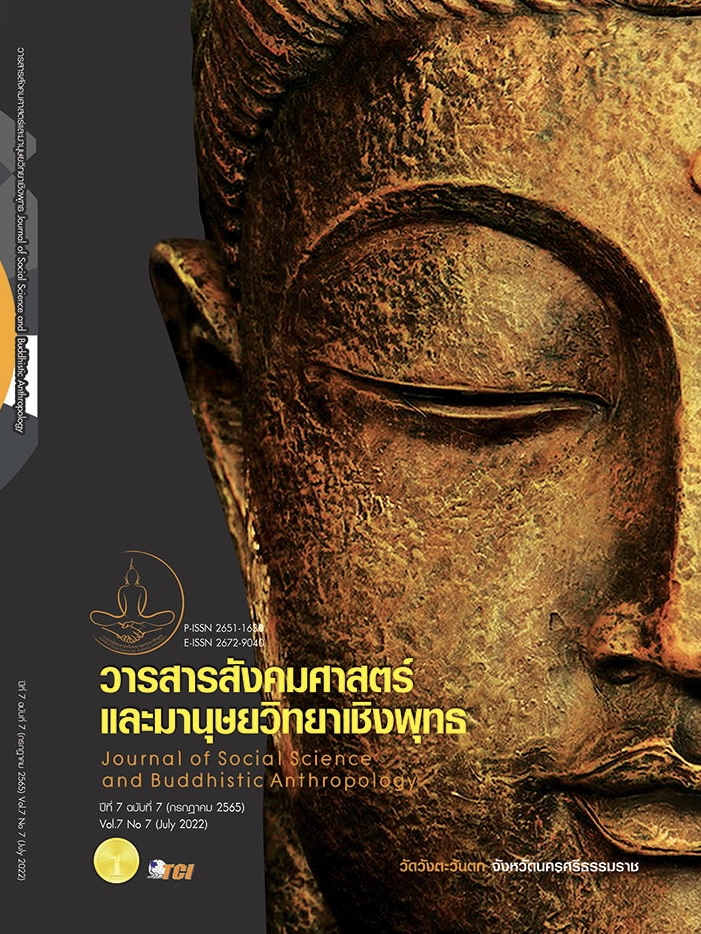DEVELOPMENT OF A COMMUNITY PARTICIPATORY HEALTH LITERACY PROMOTION MODEL TO PREVENT COMPLICATIONS IN OBESE DIABETICS
Keywords:
A COMMUNITY PARTICIPATORY HEALTH LITERACY, OBESE DIABETICS THROUGHAbstract
The objectives of this research article were to: 1) study the problem and the need for enhancing health literacy 2) Develop a model for enhancing health literacy to prevent complications in diabetic patients who are obese by community participation 3) Evaluate the model of enhancing health literacy. This research is Research and Development (R&D). The research procedures consisted of 3 phases. Phases 1 health literacy survey and self-care behavior perception the sample groups consisted of obese diabetics 351 students and health network members 12 students. The research tools consisted of: 1) questionnaires 2) In-depth interview. The statistics used in the data analysis were: 1) Qualitative data were analyzed by content analysis. 2) Quantitative data were descriptive statistics include percentage, mean, standard deviation. Phases 2 model development applying the A-I-C. Plan was pretested, it was found that: the obese diabetics technique the sample groups 30 students. Compare variables analyze descriptive information before and after the experiment Phases 3 Compare variables analyze. The results showed that the overall 6 literacy skills and 3 Or 2 Sor were found to be at the low level. technique 12 weeks. After the Activity Plan was pretested, it was found that: the obese diabetics had significantly higher level of overall health literacy mean score for preventing complications than before the pretest <.05 ( = 28.47,
= 31.80), and followed - up at the 6 weeks, it was found that the variance of the pattern with health status in all 3 groups and health literacy skills no statistically significant difference of .05 and no complications were found.
References
กองสุขศึกษา กรมสนับสนุนบริการสุขภาพ กระทรวงสาธารณสุข. (2561). การเสริมสร้างและประเมิน ความรอบรู้ด้านสุขภาพ และพฤติกรรมสุขภาพ ฉบับปรับปรุง ปี 2561. กรุงเทพมหานคร: กองสุขศึกษา กรมสนับสนุนบริการสุขภาพ กระทรวงสาธารณสุข.
ดวงหทัย แสงสว่าง และคณะ. (2561). ปัจจัยที่มีผลต่อพฤติกรรมการลดระดับน้ำตาลในเลือดของกลุ่มตัวอย่างโรคโรคเบาหวาน โรงพยาบาลส่งเสริมสุขภาพตำบลบางปูใหม่ จังหวัดสมุทรปราการ. วารสารวไลยอลงกรณ์ปริทัศน์, 8(1), 103-117.
ดิเรก อาสานอก. (2560). ผลของโปรแกรมการปรับเปลี่ยนพฤติกรรมสุขภาพของอาสาสมัครสาธารณสุขประจำหมู่บ้านที่มีภาวะอ้วนลงพุง. ใน วิทยานิพนธ์สาธารณสุขศาสตรมหาบัณฑิต สาขาศาธารณสุขศาตร์. มหาวิทยาลัยราชภัฏนครราชสีมา.
ประภาเพ็ญ สุวรรณ. (2562). การพัฒนาหน่วยงานหรือองค์กรให้เป็นองค์กรแห่งความรอบรู้ด้านสุขภาพ. วารสารสุขศึกษาและสื่อสารสุขภาพ, 1(1), 12-26.
พิทยา ไพบูลย์ศิริ. (2561). ความรอบรู้ด้านสุขภาพและพฤติกรรมสุขภาพ 3อ 2ส ของผู้บริหารภาครัฐ จังหวัดพระนครศรีอยุธยา. วารสารสมาคมเวชศาสตร์ป้องกันแห่งประเทศไทย, 8(1), 97-107.
ภัทราพร ชูศร. (2562). ความชุกและปัจจัยที่มีความสัมพันธ์กับภาวะอ้วนลงพุงในวัยทำงาน (15-59 ปี) อำเภอกุดจับ จังหวัดอุดรธานี. ใน วิทยานิพนธ์พยาบาลศาสตรมหาบัณฑิต สาขาเวชปฏิบัติชุมชน. มหาวิทยาลัยขอนแก่น.
ศิริชัย กาญจนวาสี. (2559). การเลือกใช้สถิติที่เหมาะสมสำหรับการวิจัย. (พิมพ์ครั้งที่ 7). กรุงเทพมหานคร: โรงพิมพ์แห่งจุฬาลงกรณ์มหาวิทยาลัย.
สมาคมโรคเบาหวานแห่งประเทศไทยในพระบรมราชูปถัมภ์, สมาคมโรคต่อมไร้ท่อแห่งประเทศไทย และสำนักงานหลักประกันสุขภาพแห่งชาติ. (2560). แนวทางเวชปฏิบัติสำหรับโรคเบาหวาน.พ.ศ.2560. กรุงเทพมหานคร: บริษัทรุ่งอรุณมีเดียจำกัด.
สำนักงานหลักประกันสุขภาพแห่งชาติ. (2560). คู่มือบริหารกองทุนหลักประกันสุขภาพแห่งชาติ เล่มที่ 4 การบริหารงบบริการควบคุม ป้องกันและรักษาโรคเรื้อรัง. กรุงเทพมหานคร: แสงจันทร์การพิมพ์.
อภิญญา บ้านกลาง และคณะ. (2559). ปัจจัยที่มีผลต่อพฤติกรรม สุขภาพของผู้ป่วยเบาหวานชนิดที่ 2 ในเขตรับผิดชอบโรงพยาบาลส่งเสริมสุขภาพตำบลศิลา อำเภอเมือง จังหวัดขอนแก่น. วารสารสำนักงานป้องกันควบคุมโรคที่ 7 จังหวัดขอนแก่น, 23(1), 85-95.
Chawla, A. et al. (2016). Microvasular and macrovascular complications in diabetes mellitus: Distinct or continuum? Indian Journal of Endocrinology and Metabolism, 20(4), 546-553.
Daniel, W.W. (2010). Biostatistics: afoundotion for analysis in the health sciences. (9thed.) New Jersey: Lohn Wily&Sons.
Engin, A. (2017). The definition and prevalence of obesity and metabolic syndrome.
Health Education Division, Ministry of Public Health. (2018). Literacy (promoting and evaluation) and health literacy behavior. Retrieved June 25, 2020, from https://www.scribd.com/document/406967113/2201201809140 85828-linkhed-pdf.
Karina F, et al. (2016). Health Literacy Mediates the Relationship Between EducationalAttainment and Health Behavior: A Danish Population-Based Study. Journal of Health Communication, 21(2016), 54-60.
Nunnally, J. C. (1978). Psychometric theory. New York: McGraw-Hill.
Protheroe, J, et al. (2016). The Feasibility of Health Trainer Improved Patient Self-Management in Patients with Low Health Literacy and Poorly Controlled Diabetes A Pilot Randomised Controlled Trial . Journal of Diabetes Research, 1(2016), 1-11.
Saelai M, et al. (2018). Effects of program promoting aerobic hula hoop exercise and nutritional education with social support on body mass index, waistline and blood lipid in
persons at risk of metabolic syndrome. journal of phrapokklao nursing college, 29(1), 54-67.
Samruayruen, K. & Kitreerawutiwong, N. (2018). Understanding on assessing health literacy. EAU Heritage Journal Science and Technology, 12(3), 1-13.
World Health Organization. (2016). GLOBAL REPORT ON DIABETES WHO Library Cataloguing-in-Publication Data Global report on diabetes. Retrieved June 25, 2020, from http://www.who.int/about/licensing/copyright_form/index .html
Zainuddin AA. et al. (2016). Prevalence and socio-demographic determinant of overweight and obesity among Malaysian adult. International Journal of Public Health, 6(1), 66-69.
Downloads
Published
How to Cite
Issue
Section
License
Copyright (c) 2022 Journal of Social Science and Buddhistic Anthropology

This work is licensed under a Creative Commons Attribution-NonCommercial-NoDerivatives 4.0 International License.









